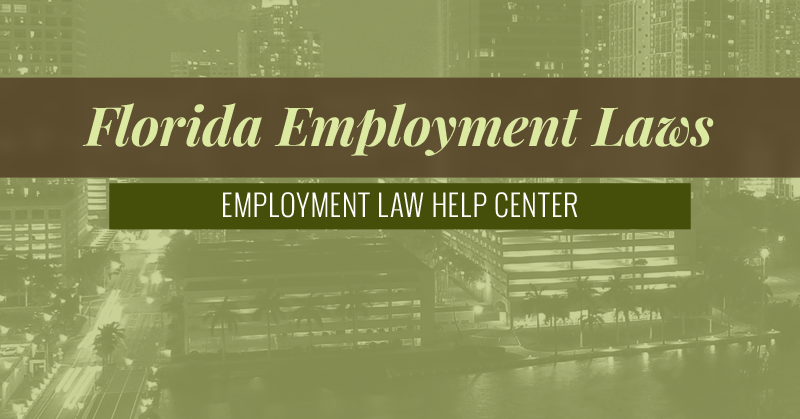Florida Employment Law Help Center
Federal and state labor laws provide important protections for employees in Florida, setting the basic standards for minimum wage, overtime, hiring and firing practices, health insurance coverage, and nearly every other aspect of the employee/employer relationship, including the right to a safe work environment free from discrimination or harassment on the part of an employer, supervisor or coworker. If you are an employee in Florida, you should know about the laws that protect your rights at work. Contact an experienced employment law attorney today, if you believe you have been the victim of a labor law violation in Florida.

Wage and Hour Laws
Under Florida wage and hour laws, employers across the state are required to pay nonexempt employees at least the state minimum wage, which is calculated each year by the Florida Department of Economic Opportunity. There are no laws in Florida that regulate meal breaks or rest periods for employees in Florida, so employers are required to follow federal law, which requires employers to pay employees for short rest periods lasting less than 20 minutes, but not for meal breaks lasting 30 minutes or more, so long as the employee is not required to work during the break.
Unpaid Wages and Overtime
While there are no state laws in Florida governing the payment of overtime wages to employees, federal law dictates that employees who work more than 40 hours in a given workweek are entitled to an overtime rate of one-and-one-half-times their regular rate of pay for all hours worked over 40. Federal and state law also gives an employee in Florida the right to file an unpaid wages claim against his employer if he is owed regular or overtime wages, or was paid at a rate below minimum wage, in order to recover any wages due plus liquidated damages.
Employment Discrimination
Federal and state anti-discrimination laws prohibit employers in Florida from making employment decisions (i.e. hiring, firing, promoting, demoting, disciplining) based on an employee or applicant’s membership in a protected class. Under Florida law, employees who are harassed, discriminated against or retaliated against because of a protected characteristic, such as race, sex, religion, national origin or citizenship status, may have a workplace discrimination claim against their employer.
Wrongful Termination
Like most states, Florida is an at-will employment state, which means employers can hire or fire employees at any time and for any reason, or for no reason at all. However, it is against the law for Florida employers to fire an employee for discriminatory or retaliatory reasons, i.e. because of his membership in a protected class, because he filed a workers’ compensation claim, because he is over 40 years of age, because he reported or objected to discrimination in the workplace, or because he objected to not being paid. This is considered wrongful termination.
COBRA Continuation Coverage
Federal COBRA continuation coverage is a law that allows employees who work for businesses with 20 or more employees and who lose their employer-sponsored health plan because of job loss, reduction in hours worked, divorce, or another qualifying event, to extend their healthcare coverage for a limited period of time. Florida also has a “mini-COBRA” law, which provides a similar continuation of healthcare coverage for employees who work for businesses with fewer than 20 employees.
SSI/SSDI Disability Benefits
Individuals in Florida who are unable to work because of a physical or mental disability that is expected to last for at least one year or result in death, may be entitled to disability benefits in the form of Supplemental Security Income (SSI) or Social Security Disability Insurance (SSDI), depending on their work history and financial need. The state of Florida also has an Optional State Supplementation (OSS) program that provides monthly benefits to indigent elderly or disabled individuals who live in residential treatment facilities.
To learn more about Federal US employment laws, browse the following topics:





